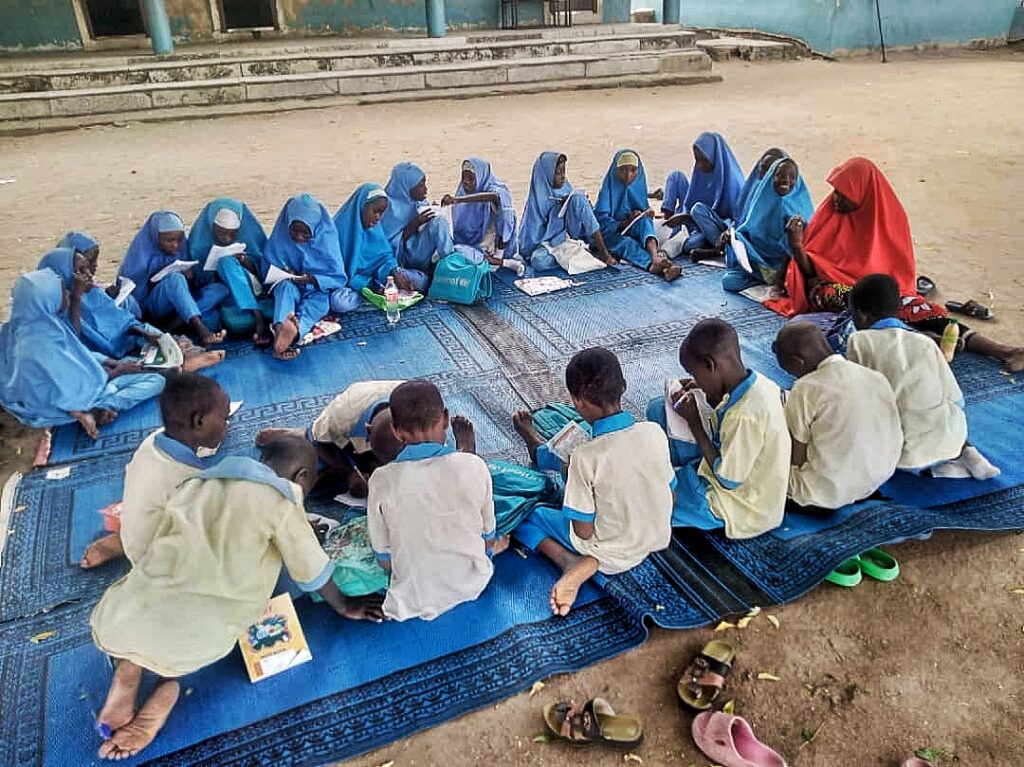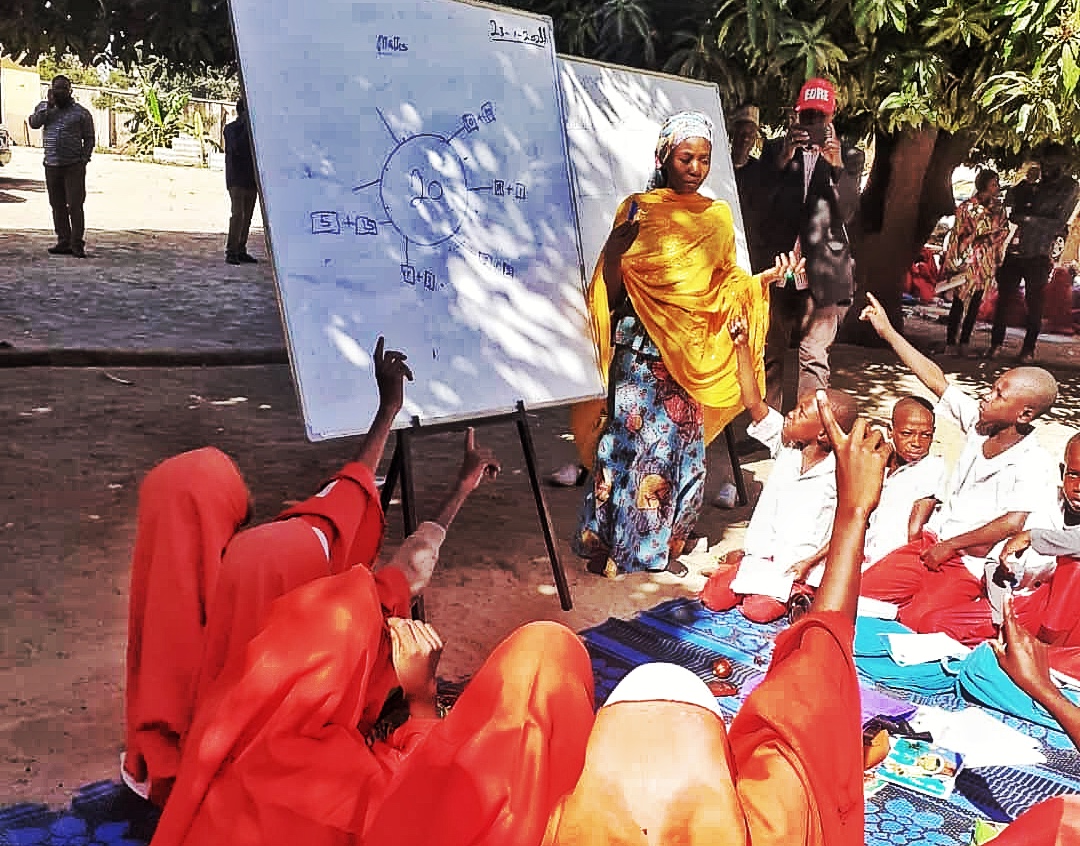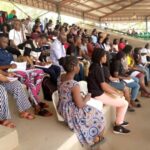Maiduguri, Nigeria: On a quiet morning at the Sanda Kyarimi Primary School in Maiduguri, Borno State, eight-year-old Umar Usman Abubakar stood outside a classroom while his classmates were busy in class. Abubakar’s face was clouded with worry. Despite spending six years in nursery and primary school, he still couldn’t read simple sentences or solve basic arithmetic problems.
Umar’s struggle reflects the harsh reality faced by many Nigerian children. While the country has made strides in increasing access to education, enrollment rates have not translated into meaningful learning. According to the 2022 State of Global Learning Poverty report, 70% of 10-year-old Nigerian children cannot read a simple sentence or solve basic numeracy tasks.
UNICEF adds that the Boko Haram insurgency has exacerbated these challenges in states like Borno, disrupting access to education and deepening learning deficits. Compounding the issue are poorly trained teachers, inadequate infrastructure, and outdated teaching methods. Studies show that a significant factor in low learning outcomes is the mismatch between curricular content and children’s learning levels.
The Northeast holds the highest number of out-of-school children in Nigeria, and even those attending school lag behind in foundational literacy and numeracy skills.
But that day signified a new dawn for Abubakar, as a team from Teaching at the Right Level or TaRL were in his school. TaRL is an initiative by Pratham, an Indian non-profit organization. In the early 2000’s, Pratham developed TaRL to equip children with reading and mathematics skills before completing primary school. The program focuses on meeting students where they are in their learning journey and tailoring lessons accordingly.
Recognized as one of the most impactful education programs globally, it has delivered significant improvements in learning outcomes and offers children like Umar a much-needed second chance to thrive academically.
In Borno, where conflict has taken a toll on education, the intervention is helping to rebuild the foundation of learning, empowering children with the tools they need for a brighter future.
How it works
The TaRL approach tailors classroom instruction to a child’s current learning level, ensuring that foundational skills in reading and mathematics are strengthened. At its core, the program focuses on grouping children based on their learning levels rather than age or grade. It employs simple tools to assess each child’s abilities, organizes groups accordingly, and uses interactive teaching methods to target foundational skills. Progress is tracked regularly to ensure that each child’s learning improves over time.
Teachers conduct TaRL activities for an hour and a half to two hours a day. Activities are done with the whole group, in small groups, or individually. TaRL encourages the use of engaging, fun, and creative activities focused on building foundational reading and mathematics skills.
Ngare Bukar, a TaRL Specialist and Master Trainer, explained, “While grouping the learners for a literacy session, you need to consider six competencies. These competencies include listening, speaking, observing, reading, writing, and doing.”

Unlike traditional classroom settings that stick rigidly to the curriculum, TaRL allows instructors to prioritize the learning levels of children. This method ensures that foundational skills are not rushed, enabling children to fully grasp concepts. Regular monitoring is another crucial component, as it helps the team evaluate progress, refine the program, and identify areas needing improvement.
TaRL’s success depends on three key teams: Programme , Instructors, and Mentors. The Programme Team manages the overall design and implementation of the program, including developing teaching materials and measuring outcomes. Instructors assess children, group them by learning levels, and lead engaging activities tailored to their groups. Mentors play a vital role by visiting classrooms, observing lessons, providing feedback, and mentoring instructors to enhance their teaching techniques.
“As TaRL Mentors, we conduct onsite monthly support and monitoring visits where we provide mentorship to trained teachers or TaRL Facilitators,” said Bukar.
The results have been impressive, said Babagana Kyari, Chairman of the School-Based Management Committee or SBMC of Modu Makaranta Mega Primary School.
“A game changer”
In September 2018, the Borno State government , with support from UNICEF, Plan International, TaRL Africa, and the UK Foreign and Commonwealth Development Office or FCDO, launched a six-month TaRL pilot program in 12 schools, reaching approximately 9,000 pupils in the state. That program was the first-ever TaRL pilot in Nigeria and the first implementation in a conflict-affected setting.
The results were remarkable: during the pilot, the number of children able to read a simple paragraph rose from 14% to 45%, while those able to perform simple subtraction increased from 11% to 59%. The pilot demonstrated that TaRL could significantly improve literacy and numeracy skills in conflict-affected areas, and this is a sentiment teachers and educators agree on.
Yakaka Muhammed, head teacher of Shehu Sanda Kyarimi Primary School, custom area, Maiduguri said the introduction of TaRL at his school“ has been a game changer” and has helped many students “in acquiring foundational literacy and numeracy skills.”
Muhammad added that “If you look at five to six years back, before the introduction of TaRL in 2018, you would notice that primary schools did not provide an equal enabling environment for learners with different competencies.”
Lawan Umar, a TaRL master trainer, mentors who offer support and training to teachers, elaborated: “The biggest reason for low learning levels was the high curricular expectations imposed on students without remedial mechanisms in place to support children struggling to meet those expectations. TaRL strategically addresses that gap.”
UNICEF Nigeria, in its Education Strategy 2019–2030, highlighted that the TaRL pilot in Maiduguri used mother-tongue instructional approaches to deliver co-curricular remedial learning tailored to children’s existing competency levels. This approach has proven transformative.
“When we started this TaRL session in September 2023, at the beginning of the 2023–2024 academic session, the children couldn’t even identify alphabets, understand simple sentences, or perform basic numeracy tasks. But within eight months, they can now read and comprehend not just simple sentences but entire stories,” said Hamsatu Jibril Babale, a TaRL facilitator.
Goni Ambare, a pupil, shared his personal progress: “Even though I can’t speak Hausa fluently, with the help of the TaRL program, I can now fluently read Hausa text.”
Parents are also witnessing significant improvements. “We have seen a noticeable improvement in the foundational skills of literacy and numeracy among our children. They can now read and perform basic numeracy tasks,” said Abba Usman, a parent.
Limitations of the TaRL intervention in Borno State
“One limitation of the TaRL Methodology used in this intervention is that it focuses on only primary 3 and 4 students, while the lower classes are not included; this increases the number of learners with learning gaps.” Said Ngare.
Evaluation reports of the TaRL pilot intervention highlighted additional challenges. These include the program’s lack of a clear mechanism to achieve and improve gender-sensitive classroom practices. Facilitators often displayed gender biases, and the training provided did not adequately address gender dynamics in teaching. “There is a pressing need for facilitators to recognize their role in improving girls’ participation in class,” the report noted.
Hamsatu Jibril Babale, a TaRL learning facilitator, also pointed out language-related issues. “We faced challenges with the Hausa-based learning materials, which are not suitable for areas where local dialects are predominant,” she explained.
But despite the challenges, Children like Umar are hopeful that that the adoption of TaRL in their school will be a turning point for him and his educational pursuits.
This story was produced with the support of Nigeria Health Watch through the Solutions Journalism Network, a nonprofit organisation dedicated to rigorous and compelling reporting about responses to social problems.
In Maiduguri, Nigeria, many children, like eight-year-old Umar Usman Abubakar, struggle with basic reading and arithmetic despite increased educational access. The 2022 State of Global Learning Poverty report shows 70% of 10-year-old Nigerian children lack simple literacy and numeracy skills. Factors like the Boko Haram insurgency, poorly trained teachers, inadequate infrastructure, and outdated methods exacerbate these challenges, particularly in Borno, which has the highest number of out-of-school children.
An initiative called Teaching at the Right Level (TaRL), developed by the Indian non-profit Pratham, offers a tailored approach to education. The program assesses children's current learning levels and groups them accordingly, focusing on foundational reading and math skills. Through interactive methods and regular progress tracking, TaRL has significantly improved learning outcomes. In Borno, a six-month pilot program launched in 2018 saw reading and math skills improve dramatically.
Despite successes, the TaRL intervention in Borno faces limitations, such as only targeting students in primary 3 and 4, neglecting gender-sensitivity, and language-related issues with Hausa-based materials. However, the introduction of TaRL has provided hope for students like Umar, offering them a second chance at basic education and better educational prospects.






